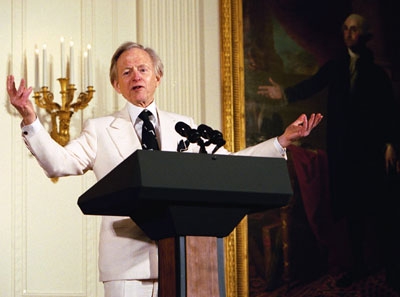You have /5 articles left.
Sign up for a free account or log in.

Tom Wolfe in 2004
Wikipedia
In 2000, Tom Wolfe published a series of essays with a catchy title: Hooking Up. For Wolfe, who had scored two best-selling novels with The Bonfire of the Vanities (1987) and A Man in Full (1998), the collection represented a brief return to his nonfiction roots. Wolfe had been a pioneer of the so-called New Journalism in the 1960s and 1970s, producing trenchant and often hilarious portraits of any American who caught his eye: hippies, astronauts, architects, and more.
In Hooking Up, Wolfe explored Silicon Valley, sculpture, and neuroscience. He shot back at John Updike and Norman Mailer, who had panned his novels. And in the collection’s title essay, he deftly captured America’s transition from Nice Girls Don’t to Naughty Girls Do.
“In the 19th century, entire shelves used to be filled with novels whose stories turned on the need for women, such as Anna Karenina or Madame Bovary, to remain chaste or to maintain a façade of chastity,” wrote Wolfe, who died last week at the age of 88. “In the year 2000, a Tolstoy or a Flaubert wouldn’t have stood a chance in the United States. From age 13, American girls were under pressure to maintain a façade of sexual experience and sophistication.”
 Wolfe’s next book, I Am Charlotte Simmons (2004) brought him back to fiction, and -- for the first time -- onto the American college campus. Its title was a nod to Flaubert’s quip, “Madame Bovary, c’est moi,” which is often interpreted as a confession of the author’s romantic and sexual frustrations. Wolfe, by contrast, was frustrated by the lack of romance in modern sex. Critics took him for a scold and a prude, but I think they got him wrong. Tom Wolfe wasn’t opposed to sex in college; instead; he felt it wasn’t sexy enough.
Wolfe’s next book, I Am Charlotte Simmons (2004) brought him back to fiction, and -- for the first time -- onto the American college campus. Its title was a nod to Flaubert’s quip, “Madame Bovary, c’est moi,” which is often interpreted as a confession of the author’s romantic and sexual frustrations. Wolfe, by contrast, was frustrated by the lack of romance in modern sex. Critics took him for a scold and a prude, but I think they got him wrong. Tom Wolfe wasn’t opposed to sex in college; instead; he felt it wasn’t sexy enough.
Like Madame Bovary, I Am Charlotte Simmons told the story of a provincial young woman trying to make her way in a corrupt world. But whereas Emma Bovary’s seduction and humiliation took place in staid 19th French hotels, Charlotte Simmons is thrown headfirst into the sexual hedonism of “Dupont University.” The varsity athletes get sex without even trying; the fraternity brothers are more deliberate (and devious) about it; and the scholarly nerds pretend they don’t want it. But everyone at Dupont is either getting laid or laying plans for the same.
Everyone except our tragic young heroine, that is. A sexual innocent from a small town, Charlotte Simmons has come to Dupont to pursue “the life of the mind” instead of the ways of the flesh. She succumbs to a preppy frat boy, who abandons her as soon as it’s over. Charlotte then slides into a deep depression. But whereas Emma Bovary commits suicide, Charlotte Simmons is nursed back to life by a nerd with designs on her. She rejects him but wins a basketball-player boyfriend, whom she met in -- yes -- a class on Flaubert. By the novel’s end she occupies an exalted rung on Dupont’s social ladder.
Status and hierarchy were recurring themes in all of Wolfe’s work, of course. But as Charlotte discovers, there is something degrading -- and depressing -- about using sex to improve your social standing. And that’s what everyone in the novel does. They’re trying to figure out who the “hottest” partner is, as defined by everyone else.
What’s sexy about that? To research his book, Wolfe interviewed students at Stanford University, the University of North Carolina, the University of Michigan, and the University of Florida. (Most readers thought Dupont was a stand-in for Duke, where Wolfe’s daughter went, but it was actually a composite.) Over and over again, students told him that the supposedly “free” sexual culture of college placed new pressures on them to act -- or at least to seem -- sexually attractive and available. And it actually made sex less pleasurable, not more so.
“Their thoughts in the middle of these sexual encounters were full of these status decisions,” Wolfe told National Public Radio’s Robert Siegel in 2004, describing his interviews. “Am I doing this right? That’s a constant worry. Will the other person feel I’m sophisticated and up to date on this stuff?” And if you resisted sex, Wolfe added, you risked a different kind of social censure. “Will I be considered a tease if I don’t go all the way with this?”
So while there was lots and lots of sex in I Am Charlotte Simmons, it was designedly un-sexy. “I wanted these scenes to be as impersonal as they in fact are,” Wolfe told Siegel. “If anybody is aroused by the many, many sex scenes, which are often quite detailed and anatomical, I’ve failed.”
Wolfe wrote his book before the rise of Tindr and other dating sites, which made sex even more impersonal -- and more competitive -- than it had been before. If you want to find out who is hot or not, all you need to do is look at your phone. There’s an app for that.
Most recently, the Title IX and #MeToo movements have highlighted the coercive quality of many sexual encounters on campus. It isn’t just that students feel social pressures to have sex, as Wolfe noted; sometimes they are forced to do it by their individual partners. Our colleges have responded with new rules and regulations, all framed around the concept of mutual consent.
But how do you know what you really want, in an environment where desire itself has become crowd-sourced? And if you don’t actually know your partner very well, aren’t you more likely to do something that she or he doesn’t want?
In his 2004 interview with Robert Siegel, Wolfe insisted that I Am Charlotte Simmons wasn’t an “indictment” of American colleges. “There are no alarms sounding in this book,” Wolfe said. “I just wanted to bring out what is really there.”
Yet the culture that Tom Wolfe described helped bring forth the alarms that we hear today. We're trying to be casual about sex but serious about consent, and it isn't working. So long as campus sex remains a game of status and competition, it will also contain elements of violence and coercion. And there’s nothing sexy about that, either.








